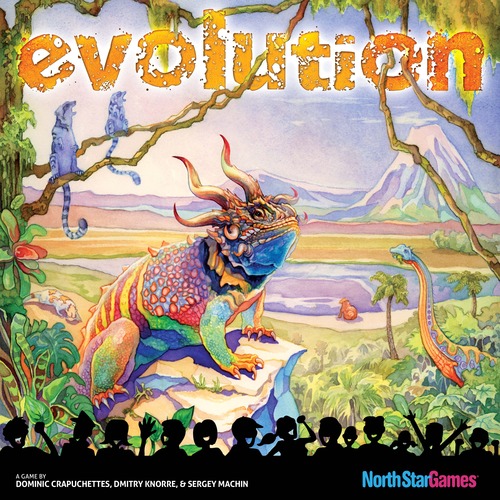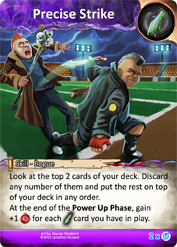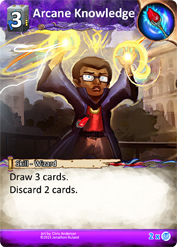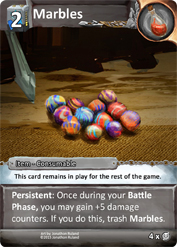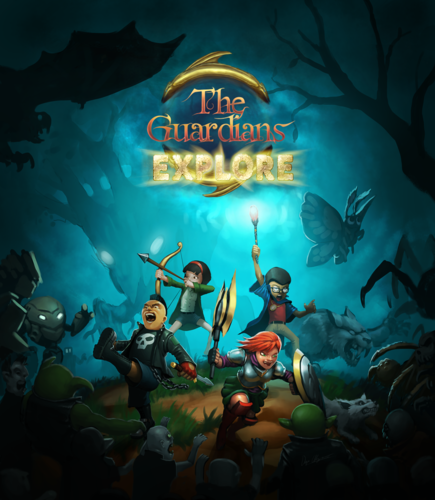As part of our September Spotlight on The Guardians: Explore, we strive to inform readers of little extra tidbits surrounding the game. Games are made by people, and one of those tidbits we enjoy is learning a little bit more about the people behind them. Some designers shy away from the public stage, while others enjoy being front and center.
In the case of Jonathon Ruland, the whole media experience is still a little bewildering even after several years of showing off his game, followed by a pair of Kickstarters to help bring it to life. In the end The Guardians: Expore, his inaugural game, is now a reality. It’s common knowledge that Goonies never say die, and thankfully, neither did he. Indeed, the one thing that remained constant throughout this whole endeavor is that he’s always happy to talk about the game and saving the town of Arthursburg from a wave of unsavory monsters.
That is, of course, the obstacle before you. In Guardians, you are a team of teenage kids attempting to save their beloved town from evil magical influences. Using elements of card drafting and deckbuilding, your task over a number of rounds is to thwart the evildoers and rack up as many monster trophies as you can carry.
How the town got to that point, and what the best course of action is to save it, we can’t say exactly. But we were lucky enough to sit down with the Oracle of Arthursburg himself to find out. May this info come in handy when it becomes your turn to be a savior. Enjoy!
Round One Questions
CR: What was your Gateway Game?
Hand and Foot. This is a game – I think – invented by my family. The game is basically a more advanced version of Gin Rummy, played with cards. Back then my hands were too small to actually hold all the cards, so my mother would place a shoe box inside it’s lid and I’d use the lip to hold all my cards. Now I bet that wasn’t the answer you were expecting! From a very young age, under 4, I was playing card games and board games. I remember playing Survive!, which was just reprinted in the last few years, many times. Then there was also Monopoly, Stratego, Risk, Chinese Checkers, etc.
CR: What was the last game you really enjoyed playing (besides Guardians)?
The expansion to Guardians! Most recently I played Evolution. However, I’m also a big fan of The Hobbit, Small World, DragonFlame, Codenames, Seasons, and Power Grid.
CR: How big is your game collection?
I’m assuming that we are strictly talking about board games: I have 36, plus four decks of traditional cards, making the total…infinite.
CR: What is your favorite type of game to play?
I tend to favor strategy games that employ a high level of appeal. That is, the art style, game user interface design, and the objective of the game. For instance, Small World immediately is more entertaining to me than Axis and Allies.
CR: How do you feel about Monopoly?
I played Monopoly plenty as a child, but with the Renaissance of board games I feel there are plenty better games people can play. I also tend to avoid games that revolve around dice unless you can manipulate them, such as with King of Tokyo, The Hobbit, Seasons, etc. TL;DR: it’s a bad game, play something else.
On The Guardians: Explore
CR: The entire premise behind The Guardians is a nice callback to classic childhood adventure stories. How did your inspiration for the game’s design come to be?
I wanted to make a game that would be fun, balanced, and “next-level.” For instance, my game plays easier if you’re already familiar with how to draft, how a deckbuilding game works, and a few other generic mechanics. I choose various game mechanics I like from other games and blended them together into this new title.
CR: What were some of your literary or cinematic influences when deciding on the theme of the game, if any?
I wanted to have a game that could resonate with everyone, and running around as a kid fighting monsters is one. It also can directly connect to kids just breaking into the gaming universe because they can see their friends in the avatars. I also referenced Pixar for the bright colors and slightly cartoony look but still with an artistic representation. There are also some similarities to Blizzard’s choice of vibrant colors.
CR: Mechanically speaking, although you build up Combat Points each round, the Energy (currency) isn’t spent when used, which is different than most deckbuilders. How did that choice work?
I picture a round more like this: you run over to the candy shop to grab a Reese’s to kickstart yourself. (Location Phase) Then you amp yourself up as you look out across the street to the game store seeing a monster thrashing your favorite table! (Power Up Phase) Then you charge forth and smash the monsters, expending all your resources to defeat that foe. (Battle Phase)
To your point, I wanted to have an innovative mechanic in Guardians which separates it from the rest of the games. I also feel that when you’re in a battle – sports or otherwise – you build up an amount of adrenaline so that you can do anything within your means. The difficult part is breaking through the barriers of reaching that next level. So in this game you gain energy so that you can play the more impressive cards, but that wont stop you from playing more at that tier that round.
CR: The Guardians mixes card drafting, deckbuilding, and board movement all together while striving to keep it pretty accessible to families and casual audiences, with things like suggested cards to draft and even preconstructed deck options. Did the game always exist at that level or did you ever have a point in design where you had to remove / change something due to issues of complexity? Like a once-per-game character ability or something?
In the initial design, everything was done in turn order, which made the game drag. While attending an Unpub, Neil Tiberwala suggested reworking some of the card effects so everyone could Power Up simultaneously. This was gold!
Many of the cards used to do more things, but the whole game took a “focusing” pass where I boiled each card down to exactly what made that card fun / good and had it only do that. I never wanted player board abilities because I wanted the game’s strategy to be at the forefront. You have all the tools to make a great deck, it was never just a case of ‘You only won because you got the Kirin player board.’ Does that make sense?
CR: Thanks to that deckbuilding style, the game allows for all sorts of cards showing up together. In all your playing, what’s the most memorable turn that you’ve seen happen?
I find the most enjoyment about being able to set up for turns where you visit the Museum to spawn another monster on the board and are able to vanquish 3 monsters in one go! Usually in order to do this it involves a Potion or two, but always feels so encouraging when you do it!
CR: One thing we noticed was that there are five child heroes in the game but only four on the artwork. Was there a reason for Raine missing? We’re guessing she was grounded.
You might also notice that there’s five monster types with a matching boss, and yet there’s the 6th boss – Zarkoth, Pit Fiend – yet he has no monsters in the game? I would wager a bet that in the next step in Reiko and Brian’s adventure we might see more of Raine and Zarkoth…
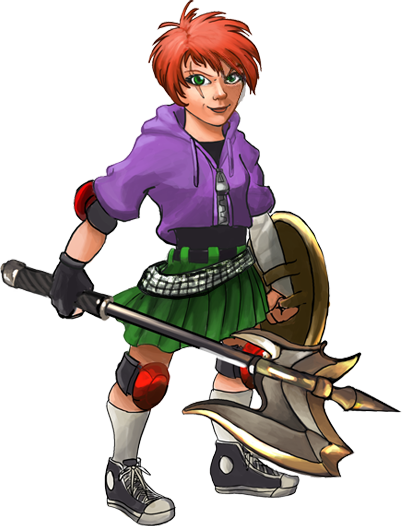 CR: The Guardians had a successful, if modest Kickstarter on its second attempt. Looking back at your campaigns, what’s the biggest thing you wish you had known going into launching them?
CR: The Guardians had a successful, if modest Kickstarter on its second attempt. Looking back at your campaigns, what’s the biggest thing you wish you had known going into launching them?
Have the game – artwork included – finished before you launch. Also, have a series of game reviews ready for launch. Lastly, have a manufacturer lined up who is ready to press the green button as soon as the Kickstarter funds are deposited. This was a lesson I learned with my first print run.
CR: Now that the game has come to completion, what’s next for you? We for once can’t help but notice that Guardians seems completely primed for expansion material.
Funny you mention that. As I mentioned earlier, Reiko and Brian will be meeting up with Raine and going on a little quest to stop the source of the monsters. But until that time I also have a little follow up game to The Guardians: Explore, where we’ll see our heroes Kirin, Daniel, Ashley, and Liam compete for a little bit more glory as the portal that Kevin, Archwarlock [one of the game’s bosses] opened, begins to close.
CR: Finally, we have to ask: have you seen Stranger Things? Because there’s a lot of similarities about saving one’s town and all…
Indeed I have seen Stranger Things, and it would be amazing if some how I could get in touch with them. I bet I could help them with a board game line…
There’s no real way to sugarcoat this: the town of Arthursburg is not in great shape. The mailman is now a zombie, the librarian is a warlock, and the neighborhood stray cat is now an angry tiger-like…thing. Even poor Harold, the hapless coffee shop clerk, has taken to marauding up and down Elm Street. It is, to put simply, a giant mess. And it’ll need some giant heroes to fix it.
Luckily, valor and bravery don’t have a height requirement.
As one of a handful of pint-sized protectors in The Guardians: Explore, your objective is to stem the tide of the evil magical influence over your beloved town. Stop the bad buys, kill some monsters, save the day. Seems pretty straightforward enough…in theory.
The thing is, we wouldn’t feel right just sending you into the real Arthursburg unprepared. Monsters and magic are rampant, but if you’re not ready, it could be a quick one-way trip. And we don’t want to deal with the red tape from that.
Instead, what we’re going to do is give you a chance at a trial run by offering up a game version of the situation instead. So grab your slingshot and bicycle, and let’s get going!
Exploring Even Stranger Things
Photo Credits: The Guardians artwork by Reihon Games; Up by Pixar Studios.

